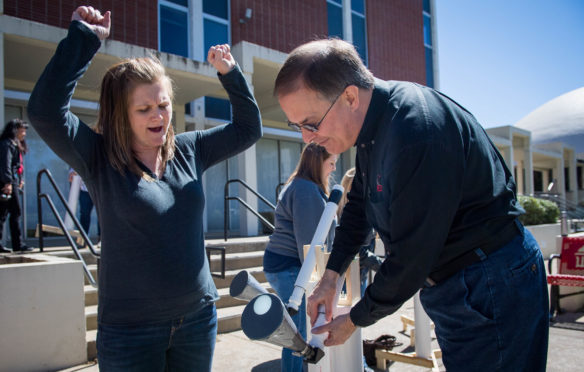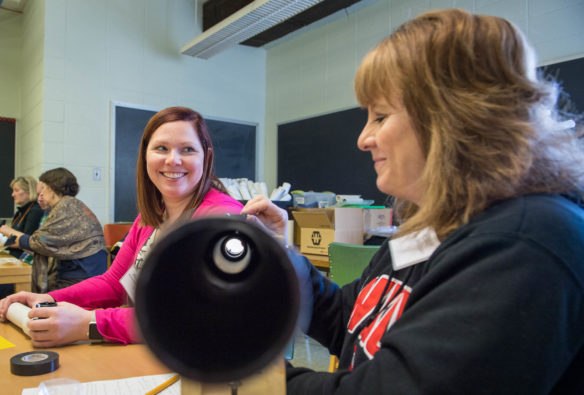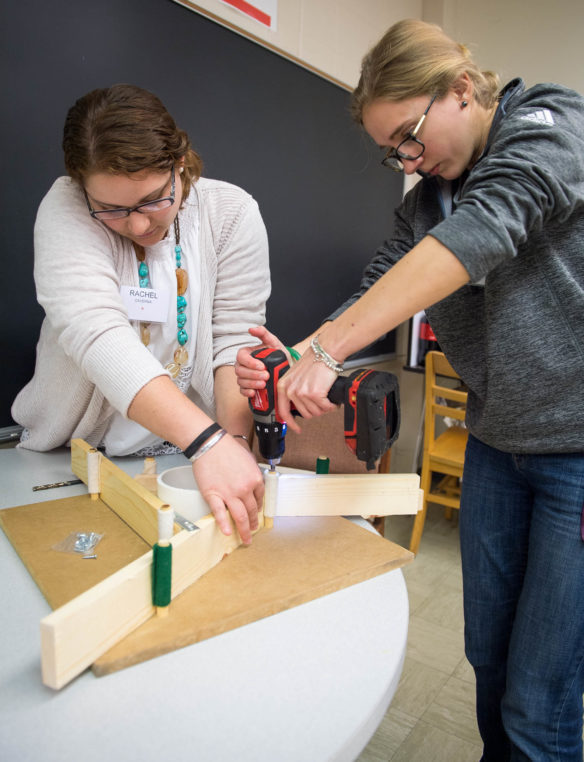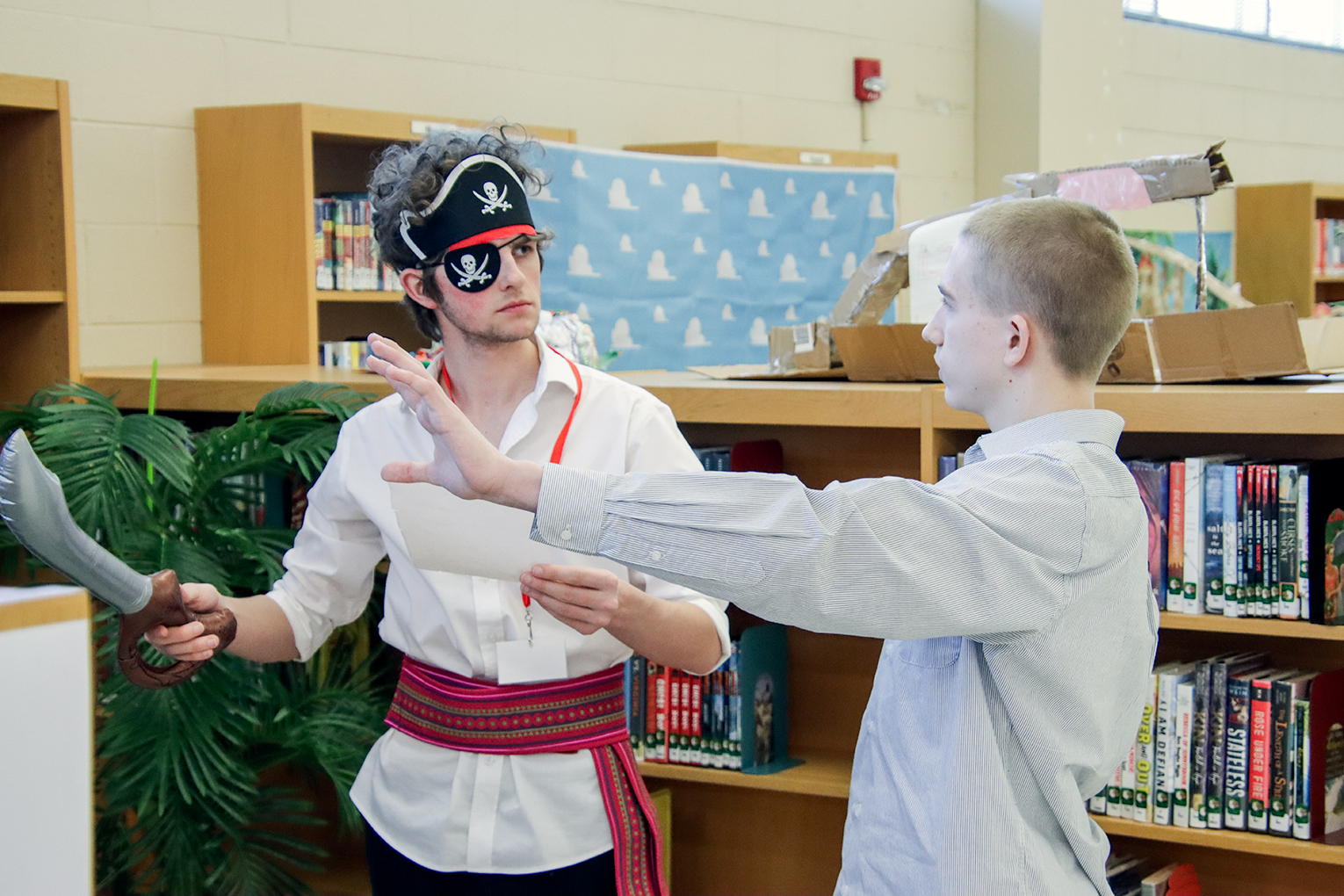
April Craft, an 8th-grade science teacher at James E. Bazzell Middle School (Allen County), celebrates as Rico Tyler, a master teacher in Western Kentucky University’s SKyTeach program, helps set up her homemade telescope to view the sun during a solar science workshop at WKU. The workshop was designed to help teachers use the Aug. 21 total solar eclipse as a teaching opportunity.
Photo by Bobby Ellis, April 7, 2017
By Mike Marsee
michael.marsee@education.ky.gov
For one day in August, Kentucky will be at the center of the astronomical universe.
For two days in April, a classroom at Western Kentucky University was filled with teachers who want to make sure their students don’t miss out on the excitement.
Those educators were preparing for the 2017 solar eclipse at a solar science workshop on the WKU campus in Bowling Green presented by SKyTeach, the school’s mathematics and science teacher education program.
The event was designed to teach educators how to use the Aug. 21 eclipse as a teaching opportunity and how to safely share it with their students, something the 50 or so educators who attended are eager to do.
“It’s a great teaching moment,” said Allison Ramsey, a 4th-grade science teacher at Greenville Elementary School (Muhlenberg County).
The last time a total solar eclipse was visible from the United States was in 1991, and that one could only be seen in Hawaii. This will be the first time a total solar eclipse has been viewable in Kentucky since 1869.
The total eclipse will be visible in 25 Kentucky counties between 1:21 p.m. and 1:30 p.m. CT. A farm in Christian County just northwest of Hopkinsville will be the point of greatest eclipse, which is marked by the instant when the axis of the moon’s shadow passes closest to the center of Earth.
Schools in areas that will see the total eclipse are preparing to take advantage of this rare opportunity.
“I think it’s important, because it’s not something you see every day. It’s a rare occurrence,” said Shelby Fisher, an 8th-grade science teacher at James E. Bazzell Middle School (Allen County). “I’ve talked to my kids about it this year and told them how it’s going to be total darkness in the middle of the day, and they’re so intrigued by that. It just gets them excited about science.”

Allison Ramsey, a 4th-grade teacher at Greenville Elementary (Muhlenberg County), left, works with Penny Roberts, an instructional supervisor in the Muhlenberg County schools, to fasten a lens onto Roberts’ telescope, during a solar science workshop at Western Kentucky University. Many educators whose schools are in the total eclipse zone are planning activities that will involve their entire school.
Photo by Bobby Ellis, April 7, 2017
Christine Duke, an elementary science consultant with the Kentucky Department of Education, said the eclipse provides an opportunity for teachers to show their students a rare astronomical event and to use that event within the framework of the Kentucky Academic Standards for Science.
“Our standards really ask students to explain phenomena,” Duke said. “So to me, this is a perfect opportunity for kids to be able to actually observe something and for teachers to engage kids in the thinking and the reasoning behind this phenomenon. What’s it all about? What’s causing it? It does align perfectly with a lot of our standards,”
Rico Tyler, a master teacher in the SKyTeach program who led the workshop, said SKyTeach is taking advantage of WKU’s position as the only Kentucky university in the total eclipse zone. He has led a series of workshops, including some in conjunction with the Green River Regional Educational Cooperative, over the past three years that are designed to educate teachers in the school’s service area and beyond about the eclipse.
“We’ve been trying to do different things to help get teachers prepared for this, train them for it, really just build awareness about this event, which is going to happen during school hours,” Tyler said. “We wanted to do something really intensive with the teachers, not just to talk to them about the eclipse, but to get them actually prepared with the equipment and the projects that they could use on the eclipse day.”
That’s just what these teachers were seeking.
“We’re kind of the resident specialists in our school as the science teachers. We wanted to just come to learn more about the eclipse, and also to have tools that we could share with our students and other faculty members for everybody to get the most valuable experience possible,” said April Craft, who teaches 8th-grade science alongside Fisher at James E. Bazzell Middle.
Duke said the eclipse is a great opportunity to help students at all grade levels understand the world around them.
“There’s a lot of opportunities where teachers could engage students beyond the content that’s specific to their grade level. Yes, they’ll have to scaffold their understanding – some younger kids aren’t going to understand it so well,” she said. “But we ask kids to identify patterns from a very young age, and there are inherent patterns that occur in the sun and the moon. Even little kids are going to observe that something different is happening.”
Preparations for eclipse day are well underway at James E. Bazzell Middle, which will have 1 minute, 49 seconds of total eclipse time.
“We’re going to make a whole day of it. If the weather holds out, we’re planning to have our entire student body outside all afternoon experiencing this phenomenon,” Craft said. “We’re going to do different demonstrations and lead the students through what they can expect and make predictions with them about what they think will happen next.”
“We’re doing a lot of interdisciplinary things,” Fisher added. “We’re going to get all of our teachers and each team involved, so there’ll be a writing component, a social studies component and things like that. I think we’re going to do a professional learning before school starts to share that with all the teachers in our building.”

Rachel Newsome, left, a 4th-grade teacher at Caverna Elementary School (Caverna Independent) works with Laryssa Cybriwsky, a 6th- and 8th-grade science teacher at Eminence Middle School (Eminence Independent), to make a base for a telescope at the solar science workshop at Western Kentucky University. Educators made telescopes that will allow groups of students to safely view the Aug. 21 total solar eclipse.
Photo by Bobby Ellis, April 7, 2017
Ramsey said the staff at Greenville Elementary – where the eclipse will be total for 1 minute, 36 seconds – are planning a whole day of activities.
“I didn’t feel like we had a choice,” she said with a laugh. “I felt like we were obligated. I told my principal about this last summer and she’s been on me since then to find things to do.”
The Muhlenberg County district has ordered 5,000 pairs of eclipse glasses for use by students and teachers at all of its schools.
Teachers outside the zone of totality are also making their plans. Everyone in Kentucky stands to get a solar show, as all points in the state will see at least 90 percent of the sun obscured by the moon, weather permitting.
“I’ve been looking for ways to incorporate the upcoming eclipse into my curriculum,” said Laryssa Cybriwsky, a 6th- and 8th-grade science teacher at Eminence Middle School (Eminence Independent).
Tyler said some schools outside the zone of totality are planning field trips to see the total eclipse, and schools inside that boundary will be hosting some of them. WKU is hosting an event for school groups at its football stadium, where there will be space for thousands of people to observe the total eclipse for 1 minute, 16 seconds.
Some teachers and students will view the eclipse through a simple telescope that Tyler said WKU has been using in workshops for about 20 years. The teachers at the SKyTeach workshop assembled their telescopes using primarily PVC pipes and wood, along with a couple of critical optical pieces, and supplemented them with a cone made from a plastic oil funnel that projects the sun’s image onto a small screen to allow for safe viewing by several people at one time.
“I was really impressed with the simplicity,” Cybriwsky said. “We have a really cool woodworking lab at school, so we’ll probably be able to build some of the telescopes that we’ve built here. We’ll probably build those the first couple of weeks of school and test them out.”
This won’t be the last opportunity for teachers to use those telescopes to view a total solar eclipse. Another one will cross the U.S. on April 8, 2024, and it will be visible in a small area of the state along the Ohio River west of Owensboro.
MORE INFO …
April Craft april.craft@allen.kyschools.us
Laryssa Cybriwsky laryssa.cybriwsky@eminence.kyschools.us
Christine Duke christine.duke@education.ky.gov
Shelby Fisher shelby.fisher@allen.kyschools.us
Allison Ramsey allison.ramsey@muhlenberg.kyschools.us
Rico Tyler rico.tyler@wku.edu




Leave A Comment